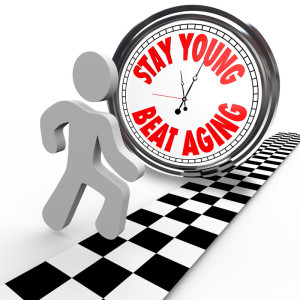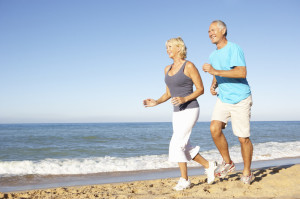Staying Hydrated is More Important than Most People Think – Continued from Part 1
Even though hydration comes from within the body, you also need to add moisture to your skin externally to keep it looking young. And since everyone is busy, busy, busy these days you have to make sure you take the time to maintain an effective skincare routine as you age (that goes for the boys too).
 The main points to consider of such a skincare routine would include gentle cleansing, exfoliation and moisturizing of the skin plus your face should be thoroughly cleansed at least once a day.
The main points to consider of such a skincare routine would include gentle cleansing, exfoliation and moisturizing of the skin plus your face should be thoroughly cleansed at least once a day.
The best time for cleansing is at the end of the day as it will help remove makeup, oil and dirt that accumulate throughout the day. Removing dead skin cells from the surface of the skin is also extremely important as you age. This process is referred to as “exfoliation”. Once you exfoliate the skin, it will allow your moisturizer to penetrate your skin more easily and to do the job it was intended to do.
A scrub with particles will also help remove the dead cells from the skin’s surface. This process is referred to as “mechanical exfoliation”. Products containing retinol will help to perform what is called a “chemical exfoliation”. These acids will help to dissolve dead skin cells and are included in most of the better known anti-aging skin care products.
There are moisturizers which are especially developed for aging skin. It is best if you use this type of product to moisturize your skin effectively. These solutions usually contain antioxidants and retinol as their main ingredients to slow down the ageing process.
Make Sure You Get Plenty of Protection from the Sun
Sun damage is one of the most powerful reasons for premature aging of the skin. It also causes skin cancer and melanomas so ongoing protection right from your early childhood years is most important. Regardless of age, it is not too late to protect your skin from sun damage.
SPF-30 sunscreen will protect your skin from the harmful UV rays of the hot summer sun and I always use an SPF-15 moisturiser in winter as well.
When you are outside for longer periods of time look for places of shade to protect your skin from sun damage. Wearing appropriate clothing and a hat can also safeguard your skin from being badly burnt. If you are in the water a lot think about wearing a rash shirt and waterproof sunscreen and reapply it regularly.
3. Mental Health – Does Yours Need a Makeover?
Unfortunately, for a larger number of ageing people than is often recognized, comes the onset of depression related diseases. But don’t be led into believing that this is a normal mental condition for people just because they are aging.
Here are just a few factors that can lead to depression in seniors so make sure you and your family members are aware if any of these things are happening in your life:
a. Social isolation
b. Chronic diseases
c. Death of a loved one
Always be constantly aware of the symptoms. Should you be having frequent feelings of sadness, grief, despair and hopelessness then it is very important for you to consult with a qualified professional as soon as possible.
They will be able to provide you with one of the many treatments available to improve your outlook the way you are feeling. Staying social and enjoying the company of others is one critical element in maintaining good mental health so don’t just shut yourself away and live like a hermit.
Joining an interest group of some sort allows you to join in and mingle with others and is a good way to uplift your spirits and improve your mental as well as physical wellbeing. If you happen to be suffering from a chronic disease there are many good support groups around where they will help you to feel better about your condition so have a look at joining one of those.
Even though it is important to practice self-care, it is also extremely important to ask for help when you need it so don’t be too proud to ask when required. This is important.
I have run across a number of situations with older people I know where some are under the mistaken impression that depression is quite normal or just a part of the process of growing old. So they do nothing about it and live a miserable life.
Well this is certainly not the case at all and you need to erase these types of thoughts from your mind and get some professional help if you are having these sorts of misconceptions.
Learn to understand why you might be having these thoughts and then learn to put some solutions in place to put you back on an even keel. Don’t hide your problems, learn to talk about them and understand them.
It is also known for older people to often have these problems:
a. Sleep disorders
b. Dementia
c. Anxiety
Once again my best suggestion is don’t let it keep getting you down……make a decision and go and do something about it.
You really can slow down mental health problems simply by starting when you are young. Look after and take good care of your body and mind with the right nutrition and plenty of exercise and you will be surprised how few problems you will have over the period of your lifetime.
Don’t be afraid to start new challenges or even reinvent yourself as you get older. That’s exactly what I am doing at the moment and I am enjoying every minute of it. Meeting new people and learning new things while keeping fit at the same time is one of the best things I have ever done.
Going back to the requirements of planning and strategic thinking has kept me mentally sharp and it will do for you too. Just do something each day that challenges your mind followed up with thirty minutes of moderate exercise. It is not hard to do and the results speak for themselves.
4. Maintaining Your Mobility is Critical for Baby Boomers
Mobility is one of the greatest concerns for people as they get a few miles up. It is the concern that they may not be able to move about and do some of the more pleasurable things (like golf, gardening, surfing etc) that they once did.
It is handy to be able to recognize some of the causes of immobility:
a. Medication use – or possibly over use
b. Heart disease
c. Muscle degeneration, generally from lack of exercise
d. Arthritis – joint related
e. Vision difficulties
f. Balance problems (these can often be related to having had a stroke)
Nutrition and exercise together will help prevent most of these mobility problems.
It is the old ‘use it or lose it’ scenario. The more active you are throughout your younger years then the more mobile you will be during your senior years so it is well worth the effort when you are younger. As some wise person once said, “preparation is everything.”
Get your eyes checked every year or so. Vision problems are important and need to be treated immediately or it will affect your mobility or end up causing you to have an accident leaving you worse off. Maybe something as simple as changing your glasses prescription is all you need.
Muscle weaknesses or balance problems should always be checked by your doctor first to determine where the problem lies. Often an adjustment to your medication is all that is needed to get you back on the road again.
If it is just a case of weak muscles from a lack of activity then the muscles can quite easily be strengthened with some moderate regular exercises.
Aerobic activity and strength training will help improve your muscle tone and strength so get to the gym and have your Personal Trainer put together an exercise program suitable for your needs. In six months time you will be back bouncing around like a teenager again.
Working your muscles and doing resistance training will also help prevent fractures and guard against the onset of osteoporosis. You will start to move more freely, be able to do more and will feel better about yourself overall.

If you haven’t exercised for some years always consult with your doctor before taking on any new workout routines to check whether it is appropriate for your current state of health. Working out with a friend or a group is always a good idea. It will keep you motivated to keep going, is more enjoyable and there is always someone there to keep an eye out for you.
You can get yourself going by taking a walk for 15 minutes or so each day and lifting some light weight – it won’t do you any harm as long as you start off slowly and build up gradually to a longer time and distance. The benefits of walking will start to show within a month or two as long as you stick at it.
The main thing is to just get out there and DO SOMETHING!
And lastly here’s something to get you moving. In a recent study researchers found by being moderately active for 30 minutes, five times a week that this simple choice of doing just some exercise, cut mortality risk by nearly 20 percent.
By giving these simple ideas a go it will help to maintain your vigour and vitality – ageing doesn’t mean you must give up everything you love; life is there to be enjoyed.
[…] Now read Part 2 for more ways to slow down the aging process. […]